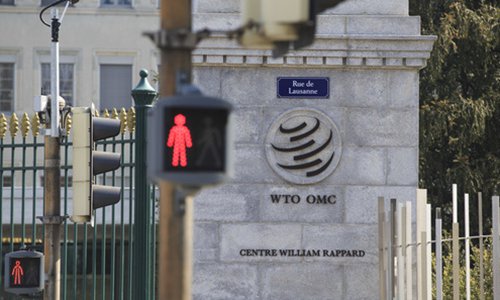HOME >> SOURCE
US obstruction of Appellate Body deals severe blow to global multilateral trade system: Chinese Ambassador
Source:Global Times Published: 2019/12/11 13:38:40

The WTO logo on the main gate of the world body in Geneva, Switzerland Photo: Xu Jinquan/Xinhua
China's Ambassador to the WTO Zhang Xiangchen on Tuesday criticized the US' obstruction of the Appellate Body of the WTO, saying that it deals a severe blow to the global multilateral trade system. He made his remarks while expressing confidence that the body will restore its functionality sooner or later as the international community cannot afford to ignore justice.Due to opposition from the US, the General Council on Tuesday failed to adopt a draft decision regarding the improvement of the functionality of the Appellate Body, a pillar of the WTO which settles trade disputes among members.
This failure means the Appellate Body will temporarily shut down, in "the most severe blow" to the multilateral trading system since its establishment, Zhang said.
The body was created when the WTO was founded in 1995. Its prominent feature is its independence, as it is free from political interference.
The current backlash the organization is experiencing will inevitably spread to the multilateral trading system, and it is not surprising that certain individuals are attempting to use their might rather than WTO adjudications to change the trade polices of other members, Zhang said.
"What does surprise me is that one member's persistence to go their own way could finally lead to the paralysis of the whole Appellate Body. This reveals the fragility of the multilateral trading system."
The paralysis of the Appellate Body may bring irreparable damage and unintended consequences to the world trade order, he said, noting that "the security and predictability we have enjoyed cannot be taken for granted."
"The international community cannot afford to lose justice. We have confidence that the Appellate Body will restore its functionality sooner or later," said Zhang.
"We note that 117 members have called for the immediate launch of a selection process, which is strong testimony to the political will of the majority of members to restore the Appellate Body," Zhang said. "More importantly, when reflecting on the improvement of the Appellate Body, we have to consider how to protect it from future systemic sabotage."
In future dispute settlements, apart from panel proceedings, members are still entitled to the use of arbitration under Article 25 of the Dispute Settlement Understanding, regardless of whether a member is happy or not, he said.
On Tuesday, Zhang said that China is actively working to support the EU's vision of an appeal-arbitration model, which essentially replicates the work of the Appellate Body, according to Bloomberg.
"This is not the best option," he said. "This is an interim solution that can help countries deal with their disputes."
Regarding the US' accusation of China's massive subsidies, Zhang citied data from the Global Trade Alert database of the University of Saint Gallen which showed that in May 2019, 45 percent of all non-agricultural imports into the US had to compete with products produced by companies receiving subsidies from the US government.
These subsidies included financial aid, state loans, and the reduction or waiving of taxation or social insurance.
"Even that 45 percent does not represent the full picture of US subsidies, because it only takes into account domestic subsidies for manufacturing companies and does not include agricultural subsidies and export incentives," Zhang said. "And the percentage for China was 23.9 percent, roughly half that of the US."
The massive agricultural subsidies provided by developed countries including the US have been distorting the trade of agricultural products for decades, and should have been eliminated long ago, according to Zhang.
China will firmly oppose the proposal of any new subsidy rules that are discriminatory in nature, he said.
Posted in: ECONOMY,BIZ FOCUS